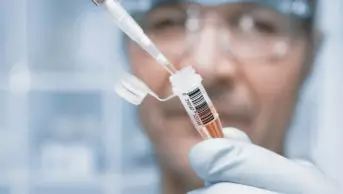
Mclean/Shutterstock.com
In spring 2020, the severity of COVID-19 became clear. The NHS needed to find an effective treatment for a dangerous, contagious virus.
At the start of this pandemic, however — the scale of which the world has not seen in a hundred years — there was no clear view of how to tackle this virus. Medical researchers imagined it might take years to develop a vaccine, so alternative treatments needed to be developed and tested quickly to save as many lives as possible. It was time to start trialling medicines.
But there was a problem: traditional clinical trial methods are, for the most part, laborious and costly affairs.
For example, two trials of PCSK9 inhibitors, which lower cholesterol and reduce the chances of heart attacks, took 12 years to develop, at a cost of more than $1bn each. Trials that would take this long simply were not an option.
Mine of information
The NHS needed results fast and at scale. The best way to do this was to tap into the existing wealth of data that the health service already holds, as well as new data flowing from COVID-19 patients. We made use of the NHS’s existing infrastructure and expertise in the UK’s universities.
At NHS Digital, as the data custodian for the health and care system, we already held a wide range of coded and analysable data that we could make available to researchers, scientists and public health officials for the benefit of health and care.
In March 2020, we had no way of making that data readily available for clinical trials but, as luck would have it, some important work was already under way. At the end of 2019, before the pandemic took hold, NHS Digital and its partners IBM, Microsoft and the University of Oxford’s Big Data Institute had been awarded funding to develop NHS DigiTrials: the Health Data Research (HDR UK) Hub for Clinical Trials.
Since then, NHS DigiTrials has been developing a range of data services designed to meet the needs of clinical trialists, using the wealth of routinely collected data held by NHS Digital. NHS DigiTrials will support clinical trials at key points where patient data can make a real difference — to support feasibility and planning, recruitment of the right cohort and tracking what happens to participants’ health over time.
This approach could revolutionise the clinical trial sector. It will widen the opportunities for patients to take part in clinical trials; reduce the cost and complexity of developing new treatments; minimise those lost to follow-up; and even reduce the cost of medicines for the NHS.
For patients and clinicians, importantly, this approach will improve the effectiveness and safety of new treatments, and make them available more quickly.
Having a global impact
NHS DigiTrials came into its own when the pandemic hit. When our consortium partner, the University of Oxford, launched the Randomised Evaluation of COVID-19 Therapy (RECOVERY) trial to test potential treatments for patients hospitalised with COVID-19, we were able to respond quickly and to demonstrate that our approach could add value to a large-scale clinical trial delivered fast.
A weekly data extract from NHS Digital’s Secondary Uses Service, as well as other data sets including COVID-19 test data, is being used to help assess the effectiveness of several potential treatments for the virus.
The platform model adopted by RECOVERY allows multiple interventions to be tested at the same time, speeding up the trial’s ability to find effective and safe treatments. By providing access to routinely collected data shared centrally by NHS DigiTrials, we are able to minimise the burden of collecting data from already pressed frontline NHS staff, and provide data on trial participants from hospitals across England from a single source.
NHS DigiTrials data has also allowed researchers to link the trial cohorts to their medical history to enable a wider range of relevant medical information (for example, from their GP records) to be used. This has supported robust analyses about those most at risk from COVID-19 and assessment of whether treatments worked as effectively for different types of patients. All this has made the trial safer and more clinically effective.
Data provided through NHS DigiTrials to the RECOVERY trial led to the steroid dexamethasone being found to help patients with severe COVID-19 — findings suggested the risk of death of patients on ventilators was cut by a third, while the patients on oxygen had their risk of death cut by a fifth. Dexamethasone has reportedly saved around one million lives around the world, and 22,000 lives in the UK, from COVID-19 since this breakthrough result was announced on 16 June 2020.
These phenomenal results show just how valuable NHS DigiTrials is, and on a global scale.
Negative results are just as important: RECOVERY has also found that three other treatments (azithromycin, lopinavir−ritonavir and hydroxychloroquine), which were being widely used globally, provide no benefit for patients hospitalised with COVID-19. These results have allowed clinicians and researchers to focus on other treatments.
Building on success
More recently, we have been working to support recruitment into another clinical trial — the Platform Randomised trial of INterventions against COVID-19 In older peoPLE (PRINCIPLE) — which aims to find COVID-19 treatments for people aged 65 years and above and those aged over 50 years with certain medical conditions that can be taken at home, to prevent their condition deteriorating and avoid the need for hospitalisation.
The study, which HDR UK played an important role in convening discussions for, looks at usual care at home to recover from coronavirus, against three separate drugs: azithromycin, doxycycline and inhaled budesonide.
Although the study had been running since April 2020, the participant numbers remained low as it was hard to find and engage with patients in the community, especially when they were feeling unwell. Compounding this is a very short timeframe of seven to ten days to recruit relevant participants following a positive COVID-19 test and start them on one of the treatments.
NHS Digital is making a difference here too. Our daily flow of COVID-19 test data has allowed the PRINCIPLE trial team to identify those suitable for the trial who have tested positive for the virus and invite them to take part. By calling and explaining the trial over the phone to people at an early stage of their illness, researchers have opened up the opportunity to take part for a wider range of potential trial participants.
In fact, the number of participants recruited to take part in the trial doubled to 200 per week.
Big step forward
We will continue to work with the PRINICIPLE trial to help them recruit people to find treatments that prevent those at the highest risk from being hospitalised with COVID-19. But we won’t stop there.
Platform, or multi-arm, trials such as this — in which several different treatments are investigated under the same trial infrastructure — have huge potential once we emerge from the pandemic too. Anecdotally, there is some interest in how this approach can make it faster and more efficient to find safe and effective treatments for widespread and common illnesses, such as cardiovascular disease.
As well as more opportunities for further treatments, there will also be more opportunities for working together. The NHS DigiTrials approach makes it possible for groups of researchers to collaborate on the same trial at the same time. New arms can be added, and others can be retired. Trials of different treatments can run simultaneously, all within a common trial framework. This lends itself to using routinely collected NHS data, which provides consistent outcomes and follow-up data over extended periods of time.
This undoubtedly is a positive step for the NHS and its patients. Through the NHS DigiTrials programme, we can reduce the cost of bringing new drugs to market and collaborate with clinical trialists to solve some of their important challenges, such as finding and recruiting the participants they need to make them successful.
Truly working together
But NHS DigiTrials is not just about better use of the routine NHS data: this work also marks a change in the way we work with researchers. We have recognised that we need to streamline our processes, help trialists to use them, and build our services with the needs of trials in mind. Our ambition is to work closely with more researchers to help them understand how we can provide them with the data services that they need to conduct their trials.
We are also working with patients, who we feel should understand how their healthcare data are vital to improve health and care across the country, and encourage more people to sign up for clinical trials. That is why our feedback from our co-development panel of patients and the public is influencing the way in which we develop our services, and how we communicate them. Particularly, we encourage more people from diverse backgrounds and age ranges to sign up to clinical trials such as this. And not just during the pandemic; we must improve our understanding of how different demographics respond to a wide array of treatments, for health equality for everyone.
Already, we have seen big successes from NHS DigiTrials — a strong foundation on which we can build our services so that they support development of many more treatments for many years to come.
Heather Pinches, head of clinical trials service, NHS Digital
Read more: Everything you need to know about the COVID-19 therapy trials


